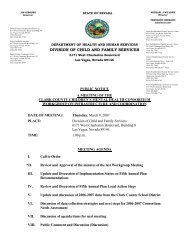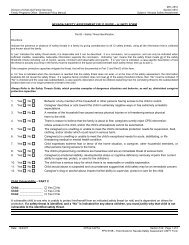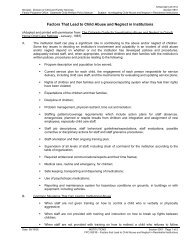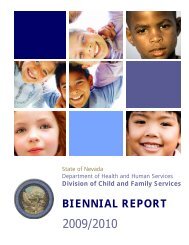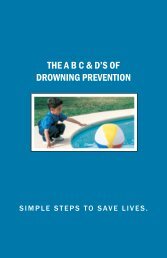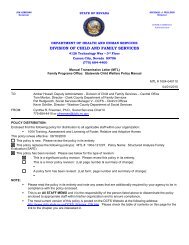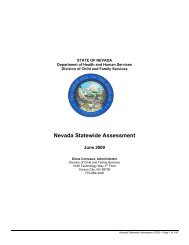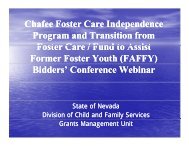STATE OF NEVADA - Division of Child and Family Services
STATE OF NEVADA - Division of Child and Family Services
STATE OF NEVADA - Division of Child and Family Services
Create successful ePaper yourself
Turn your PDF publications into a flip-book with our unique Google optimized e-Paper software.
to address <strong>and</strong> overcome presenting challenges that limit comprehensive, consistent IL program services<br />
throughout the State. The Casey <strong>Family</strong> Programs assisted in the IL Program assessment <strong>and</strong><br />
evaluation <strong>and</strong> the development <strong>of</strong> a st<strong>and</strong>ardized overall service program delivery system. The IL<br />
Program continues to strive to improve IL services to youth in out-<strong>of</strong>-home care by evaluating the quality<br />
<strong>and</strong> efficacy <strong>of</strong> its current IL programming <strong>and</strong> opportunities extended to youth <strong>and</strong> reviewing ways to<br />
enhance fuller access <strong>and</strong> participation, identifying gaps in the service array, <strong>and</strong> building greater<br />
collateral involvement with community stakeholders throughout the state. In order to continue the work<br />
DCFS facilitates a Statewide IL Workgroup which meets twice per month to address issues concerning IL<br />
throughout the state.<br />
3. DCFS will continue to elicit assistance from the NRCYD in order to support activities/practices to assist youth in<br />
developing the skills necessary for successful transition to adulthood.<br />
(a) In addition, there will be an emphasis on how to create <strong>and</strong> sustain statewide <strong>and</strong> local advisory boards to<br />
assist youth with advocacy, self-advocacy, leadership development, <strong>and</strong> program improvement efforts.<br />
Officers on the Statewide Youth Advisory Board will receive training in public speaking <strong>and</strong> technical<br />
assistance in tracking <strong>and</strong> monitoring state <strong>and</strong> federal legislation related to foster care youth <strong>and</strong> other<br />
social welfare policies impacting them. These youth will also receive training on how to give effective<br />
testimony before legislative committees.<br />
4. DCFS recognizes the need for continuous training <strong>and</strong> technical assistance as follows:<br />
(a) Continue to utilize training <strong>and</strong> technical assistance from the National Resource Centers for development<br />
<strong>and</strong> implementation <strong>of</strong> IL programs statewide <strong>and</strong> Casey <strong>Family</strong> Programs;<br />
(b) Collaborate with foster care training, recruitment, <strong>and</strong> licensing to develop an IL training module for foster<br />
parents;<br />
(c) Include IL foster youth (current <strong>and</strong> former) to assist in the training <strong>of</strong> foster parents;<br />
(d) Provide statewide training to existing foster parents <strong>and</strong> care providers regarding IL services <strong>and</strong><br />
resources;<br />
(e) Develop training for staff <strong>and</strong> supervisors regarding the identification <strong>of</strong> significant connections for youth<br />
<strong>and</strong> how to perform diligent search;<br />
(f) Train staff <strong>and</strong> supervisors to ensure that they are knowledgeable about the full array <strong>of</strong> housing options<br />
that best meet the individualized needs <strong>of</strong> youth.<br />
(g) Collaborate to enhance the coordination between IDEA <strong>and</strong> IL planning; <strong>and</strong><br />
(h) Continue to provide statewide training to all workers, supervisors, IL partners <strong>and</strong> stakeholders regarding<br />
IL, <strong>and</strong> access to services.<br />
5. DCFS will build collaboratives with other federal agencies serving at-risk <strong>and</strong> neediest youth through the Shared<br />
Youth Vision Initiative by December 2012.<br />
(a) Collaborative Development will occur with the following:<br />
i. Transitional Living Programs<br />
ii. Workforce Investment/Employment Training<br />
iii. Department <strong>of</strong> Education<br />
iv. Department <strong>of</strong> Labor<br />
v. Department <strong>of</strong> Housing <strong>and</strong> Urban Development<br />
6. DCFS will ensure full Implementation <strong>of</strong> the National Youth in Transition Database by September 2010.<br />
The <strong>Division</strong> <strong>of</strong> <strong>Child</strong> <strong>and</strong> <strong>Family</strong> <strong>Services</strong> has been actively involved in the implementation <strong>of</strong> NYTD through staff<br />
participation in all federally sponsored NYTD trainings <strong>and</strong> webinars. Beginning in the summer <strong>of</strong> 2009, DCFS created a<br />
NYTD workgroup consisting <strong>of</strong> the Independent Living <strong>Services</strong> staff <strong>and</strong> the Information Management <strong>Services</strong> unit<br />
(IMS). To date, DCFS has completed the following:<br />
Nevada APSR – SFY 2010<br />
Page 94 <strong>of</strong> 108



